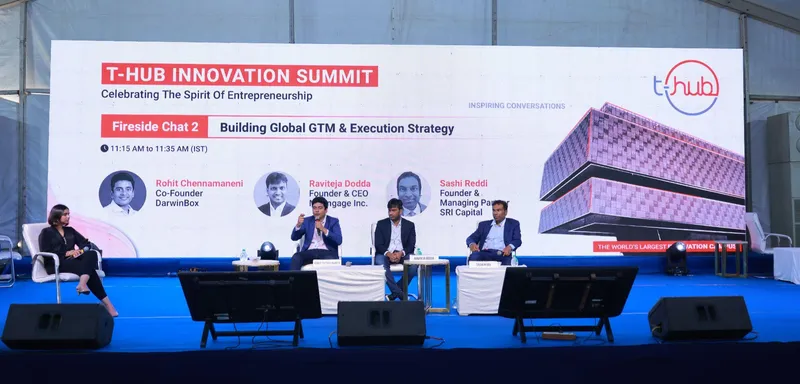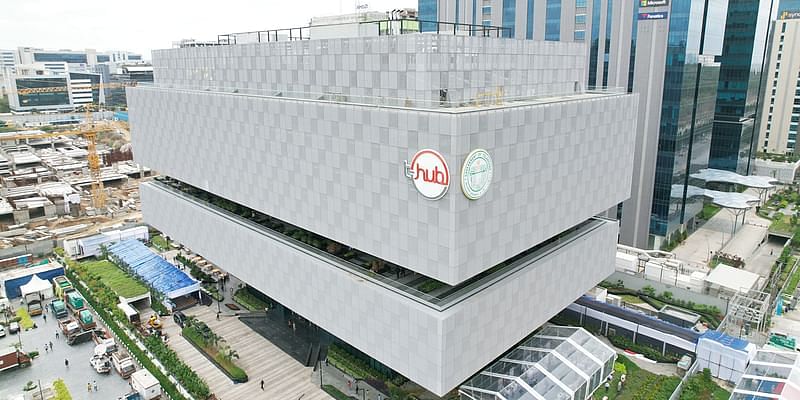Innovation has become one of the most popular business buzzwords right now, more so post-pandemic. Several businesses set up shop during this time, reflecting their drive for agility and the desire to come up with something different. But the biggest piece in this puzzle has been technology, which has played the role of an ecosystem enabler that will shift orbits for entrepreneurship.
One of the leading states with a well-established startup ecosystem is Telangana. Vibrant talent, well-equipped infrastructure, and technological prowess — it boasts all the ingredients to boost innovation and entrepreneurship. In fact, it was one of the first to launch the Innovation Policy in 2016, with the help of technology and research professionals.
Over the years, Telangana has jumped from the 4th to 2nd rank, in the India Innovation Index 2022, released by NITI Aayog, reflecting how the state has immense potential to scale up many more startups.
Understanding the T-Hub Innovation Model
Telangana’s growth journey has been ably supported by T-Hub, which opened its doors as an incubation facility in Hyderabad, in 2015. The centre was launched as a joint partnership between the Telangana government and the International Institute of Information Technology – Hyderabad, the Indian School of Business, and the National Academy of Legal Studies.
T-Hub has supported over 2,500 startups since its inception, and these startups have raised over $1.9 billion in funding.
Taking a step forward in the right direction, T-Hub has also created the world’s largest innovation hub to reinforce its commitment to making entrepreneurs successful, with access to 6Ms (Mentors, Market access, Methodologies, Money, Manpower and Motivation) and 2Ps (Partnerships and Policy advisory).
T-Hub’s success is reflected in the impact it has created ever since its inception. So far, it has delivered 100+ innovation programmes, enabling startups to scale nationally and globally. Its initiatives have also helped companies connect with potential investors, the corporate community, as well as national and foreign government bodies.
Built and architecture
In the past seven years, T-Hub has worked towards building an ecosystem that further nurtures entrepreneurship and innovation. Their Innovation Campus, which is the world’s largest, has a total built-up area of 5,85,000 sq ft.
A state-of-the-art destination, T-Hub has been created to enhance the innovation experience. Its design is unrivalled, drawing inspiration from Hyderabad’s iconic structure, Charminar. It is a T-shaped (representing technology) 10-storey structure, which is minimalistic in its form and treatment.
Step inside the building and you will be impressed with its world-class interiors. The campus has fixed, flexi office space for startups, including multiple collaboration zones, meeting rooms, floor pantries, and a dedicated cafeteria.
A futuristic approach
Keeping in mind the ever-evolving needs of the startup ecosystem, T-Hub focuses on a few key areas, namely, healthcare, fintech, advanced technologies, smart city and mobility, and social impact. There are over 100 mentors and value partners to support any startup’s growth journey. What’s more, T-Hub has an ecosystem that helps with customised hand-holding around a startup’s inflection points.
With digitalisation at the forefront and a shift in consumer behaviour, innovation is the need of the hour to foster growth. While creativity and intellect are essential to moving forward, having a differentiated competitive strategy, creating a sustainable business model, and building external networks, are equally important.
Extending support to stakeholders
The T-Hub network is extensive and comprises several stakeholders, including mentors, innovation partners, governments , corporates,investors and academia. Its mission is to drive results and collaboration for entrepreneurs’ success in the innovation ecosystem.
T-Hub works with startups through their innovation journey, from emerging to disruptive. As an offshoot of the Government of Telangana, the government plays a primary role in its innovation engine.
Beyond the Government of Telangana, NITI Aayog, Department of Science and Technology India, and MyGov are other key partners that accelerate nationwide startup initiatives.
Additionally, T-Hub also works closely with academia, many of whom hail from some of the leading universities in the country, to help in enabling opportunities for young minds in universities and colleges.
T-Hub has partnered with leading investors such as Hyderabad Angels, LetsVenture, Indian Angels Network, and SucSEED Indovation to drive high-yielding investments in startups. Their network also includes mentors, who share industry knowledge, tips, and experiences to navigate the hurdles around innovation.
Furthermore, T-Hub collaborates with ecosystem enablers and service providers to drive agility and near real-time operations. These also help foster a culture of innovation that would create a global impact.
T-Hub Innovation Summit
The T-Hub Innovation Summit, held in Hyderabad on 28 June 2022, brought together some of the best minds in the startup ecosystem to discuss the opportunities, challenges, and what lies ahead.

The ‘Building Go-to-Market execution and strategy’ panel discussion featured the likes of Rohit Chennamaneni, Co-founder, DarwinBox; Raviteja Dodda, Founder and CEO, MoEngage Inc; and Sashi Reddi, Founder and Managing Partner, SRI Capital, who shared nuggets on how to go global, the importance of having an effective go-to-market strategy, and how small companies can develop an execution strategy.
“Over the years, we have seen the market expand from urban centres, all the way to small towns and even villages today. A large part of that push has come from data availability, and also in the last two years, because of lockdowns. In order to penetrate into the smaller towns and cities, we have started partnering with local entrepreneurs; the idea is to create a network of partners, where you can’t be present yourself,” shared Suraj Saharan, Co-founder, Delhivery, during the fireside chat ‘Building Global GTM and Execution Strategy’.
For founders, regulatory hurdles can also be part and parcel of their journey, but do they always serve as an impediment or can they help too? This is exactly what was discussed in a masterclass that was steered by Avinash Godhikindi, MD and CEO, Zaggle and Rajiv Gupta, President, PolicyBazaar.
There were also panel discussions on Medtech: Transforming healthcare for the future, and Demystifying Web 3 and Metaverse that proved to be insightful.
The future
Since its inception in 2015, T-Hub has consistently worked towards building a comprehensive global innovation hub. It has also institutionalised programs for startups, corporates, and other stakeholders, delivering 75+ innovation programmes to date.
Its success lies in the numbers – today, T-Hub is working with 600+ corporates from the previous 435 and has also increased the number of academic partners. Their network spans 70+ investors that are supposed to reach 150 in a year.
The next step for T-Hub is to enable its startups to solve problems for the global market. It will focus on becoming the source of demand for innovation by creating an innovation economy in the state.










![Read more about the article [Weekly funding roundup Feb 6-19] Sharp rise in VC inflow with EV startups in focus](https://blog.digitalsevaa.com/wp-content/uploads/2022/11/funding-roundup-LEAD-1667575602969-300x150.png)